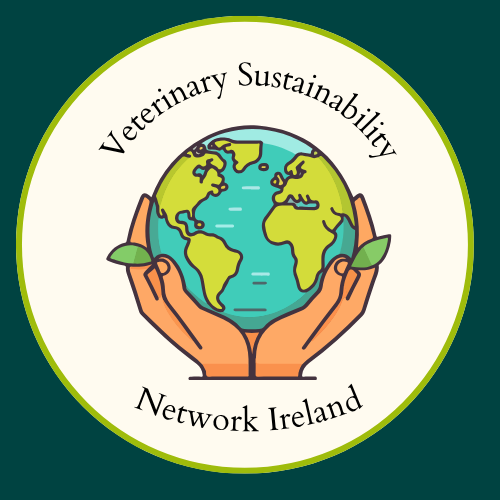VSNI survey
As the world grapples with the urgent climate, waste, and biodiversity crises, every sector must examine its role in environmental sustainability - including veterinary medicine. A recent voluntary survey conducted by the Veterinary Sustainability Network Ireland gathered insights from 105 members of the Irish veterinary community to assess awareness, current action, attitudes, and support needs around sustainability in veterinary practice.
Why Veterinary Sustainability Matters
Veterinary professionals operate at the intersection of animal, human, and environmental health, making the profession uniquely positioned to lead in sustainable healthcare. A 2020 statement from the World Veterinary Association affirms this responsibility, calling on vets to protect ecosystem health and demand climate action. In Ireland, the public supports such efforts with the EPA’s 2024 Climate Change in the Irish Mind survey finding that 87% of respondents believe Ireland must reduce its own emissions.
Previous research supports the role of vets as sustainability leaders. In a 2021 study, 91% agreed that veterinary professionals should help make clinics more environmentally sustainable, and 62% felt vets should be strong advocates for climate and health.
Survey Objectives and Demographics
This survey aimed to:
• Measure awareness of sustainability in Irish veterinary practice
• Assess current levels of sustainable action
• Understand attitudes toward sustainability
• Identify support needs to enable sustainable change
Of the 105 respondents, 79% were in clinical practice. Among those, 82% were vets with 23% being practices owners or shareholders, 12% were veterinary nurses. A small number came from other practice roles, research, academia, the Department of Agriculture, or the pharmaceutical sector.
Awareness vs. Action
While 66% of respondents said climate change and sustainability were personally very or extremely important, only 29% felt their workplace shared the same level of concern.
Chart representing answers on the importance of sustainability.
A quarter of respondents believed their workplace was doing “nothing at all” on sustainability, and a further 38% said their efforts were minimal. When asked about measuring emissions-related metrics like energy or waste, 38% again said no action was being taken. Only one respondent reported that their workplace was actively targeting the 2030 emission reduction goals set in Ireland’s Climate Action Plan.
Accreditation and Organisational Involvement
Just three of the 83 represented practices were pursuing sustainability certification. Two were using EcoMerit, and others mentioned MyGreenLab and ISO14001. Around 25 individuals and 23 workplaces were involved in sustainability networks such as Vet Sustain or the Veterinary Sustainability Network.
Perceived Benefits and Motivations
Respondents recognised clear environmental benefits to sustainable action, but rated business-related benefits (like customer trust or improved credibility) as less important. Personal satisfaction and improved morale were recurring themes in open responses.
Barriers to Action
The biggest barrier was time, with 56% ranking it as a strong or very strong obstacle. Cost, limited knowledge, and lack of government support were also widely reported as challenges. Many respondents mentioned internal barriers, such as lack of staff engagement and organisational motivation. Others cited structural challenges like building constraints, long travel distances for ambulatory vets, and heavy use of single-use plastics.
Potential Actions and Solutions
When asked how their workplace could reduce emissions, the most popular responses included:
• Switching to renewable energy (solar panels)
• Transitioning to electric vehicles
• Improving waste management and reducing energy use
Other ideas included improving heating systems, reducing anaesthetic gas usage, planning more efficient travel routes, and turning off unused devices.
On broader sustainability goals, respondents suggested:
• Reducing antiparasitic and antibiotic use
• Creating wildlife areas
• Embracing the circular economy
• Including sustainability in veterinary education
Supports Needed
Participants were asked to rank six types of support. The most desired support was easy-to-follow guidelines and checklists, followed by information on grants. Surprisingly, educational resources were ranked lowest, though nearly 40% still considered them important.
Chart representing the supports our respondents believe are needed most.
Other suggestions included organisational leadership from veterinary bodies, in-house sustainability initiatives, and even regulatory enforcement of sustainable practices with fines for non-compliance.
Final Reflections
Some respondents expressed concern about non-recyclable packaging and the anxiety caused by the volume of waste generated in clinics. Others highlighted deeper challenges, including well-being and salaries, making sustainability seem out of reach for many.
This survey reveals a veterinary sector that is personally engaged with climate concerns, but under-equipped to act. While the will is there, time, cost, and systemic barriers are holding practices back. Targeted supports, leadership from industry bodies, and policy incentives could empower vets to step into the sustainability leadership role many are ready to embrace.


